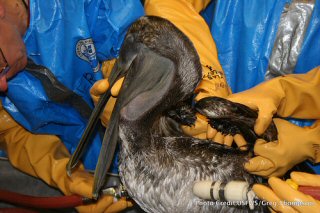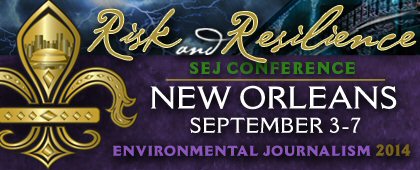Journalists are eligible for free email subscriptions to SEJournal, including TipSheet, WatchDog (on access issues) and more.
Welcome Back
to
New Orleans!
| AGENDA | REGISTRATION |
| Agenda | Coverage | Lodging/ Travel | Exhibits/Receptions | Environmental News | About New Orleans |
It’s been 11 years since SEJ first came to New Orleans, and I’m inviting you back for an unexpurgated return visit to see for yourself what’s happened in the aftermath of two of the nation’s most historic disasters.
This is the city I’ve fallen in love with during the past 30 years despite its flaws, including those that led to both the flooding in the aftermath of Katrina and the oiling after the Deepwater Horizon disaster. On our full-day bus tours and in our panels, meet our residents, both those who survived Katrina and those who moved to New Orleans to help it rebuild. Learn about the struggles of our fishers, many of whom saw their boats destroyed during the hurricane and then found their new boats forced to lay at anchor for an entire fishing season by the oil spill. Some of those same fishers found their other jobs – as offshore oil workers – also idled by the spill. Talk to our chefs, who have survived, and sometimes failed, on the frontline of a rapidly-changing worldwide seafood industry hit by bans of some fishing methods aimed at improving fish populations, by the shutdown of fishing during the oil spill, and by threats posed by the freshwater accompanying sediment that will flow through wetland-building diversions along the Mississippi River.
 |
Oil-impacted Brown Pelican is being cleaned at a Wildlife Rehabilitation center in Plaquemines Parish, Louisiana. USFWS/Greg Thompson. USFWS/Greg Thompson. |
It’s been nine years since the combination of poorly designed and built levees and floodwalls and Hurricane Katrina’s storm surge devastated New Orleans. And it’s been four years since the blowout of BP’s mile-deep Macondo well sank the Deepwater Horizon drillship, killing 11 onboard and beginning an 87-day uncontrolled release of oil and gas into the Gulf of Mexico that quickly soaked wetlands and beaches in Louisiana with crude. These two events, and the ability of New Orleans and Louisiana to recover from their effects, represent the risk and resilience that are the theme for SEJ’s 24th annual conference.
When Hurricane Sandy hit the Mid-Atlantic States in 2012, the lessons learned in Katrina’s aftermath were used to guide recovery efforts. The nation’s civil engineers, led by the Army Corps of Engineers, used the information gleaned from forensic investigations into levee and wall failures to rewrite the manuals used to build new structures worldwide, including incorporating a modern understanding of the risk of future hurricanes combined with the expected effects of global warming on sea-level rise in determining how high those structures should be built. Both traditional nonprofits like Habitat for Humanity and non-traditional aid from Common Ground and Brad Pitt’s Make It Right Foundation created new methods for combining sustainability with human kindness.
And the BP disaster has both triggered new rules and technology for dealing with the risk of future deepwater disasters, and will fund what will be the largest environmental experiment in history – the multi-billion dollar rebuilding of Louisiana’s wetlands, and a variety of other projects aimed at restoring the oil spill’s damage.
We’re going to be in New Orleans, folks, and that means good music and food, including a Saturday night party at Rock-n-Bowl, and beat dinners at restaurants in the French Quarter.
So join us in the City that Care Forgot for beignets and boudin on Bourbon Street; for superstars of stage, screen and jazz clubs that will answer all your “who dats;” for celebrity chefs and fascinating speakers who will test both your palate and your intellect; and for venues that will allow you to mix oysters, alligators, roseate spoonbills and shrimp with environmentalists, scientists, civil servants, captains of industry and all our folk who live down by yo’ momma an’ dem.
Conference Chair:
Pulitzer Prize-winner Mark Schleifstein, Environment Reporter, The Times-Picayune and NOLA.com
- February 7, 2014: "NOLA.com | The Times-Picayune asked readers to meet with environment reporter Mark Schleifstein at the Village Coffee & Tea Company on Monday morning to discuss what environmental issues should be covered during the coming year. The discussion was part of an ongoing series of such events designed to allow readers and reporters to discuss issues of importance to the community." Full story.
- Read more New Orleans and area environment news here.











 Advertisement
Advertisement 


